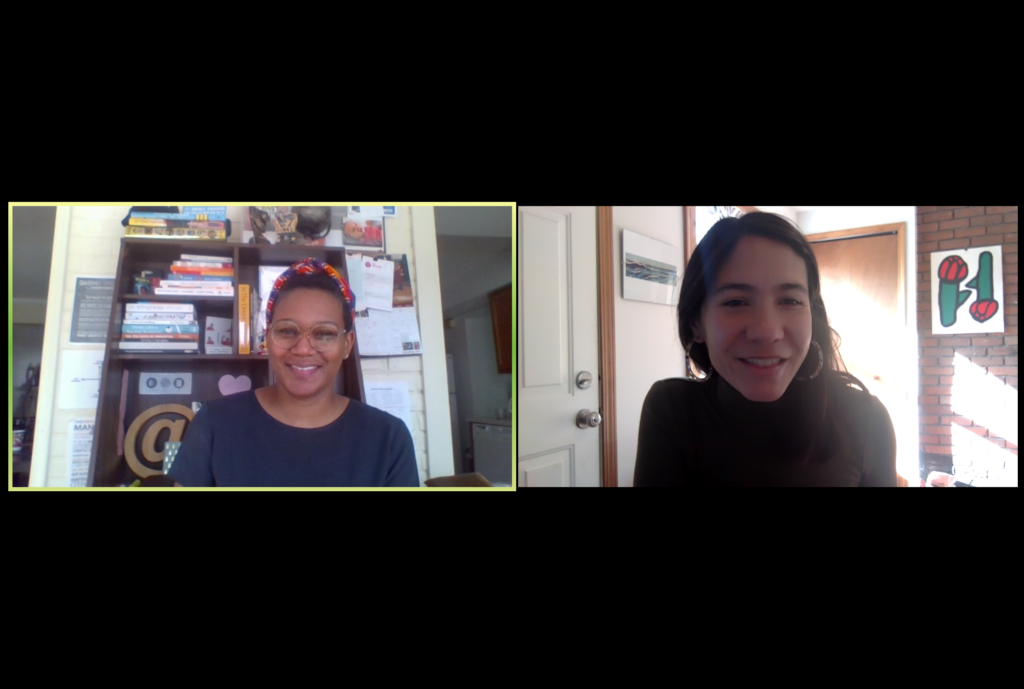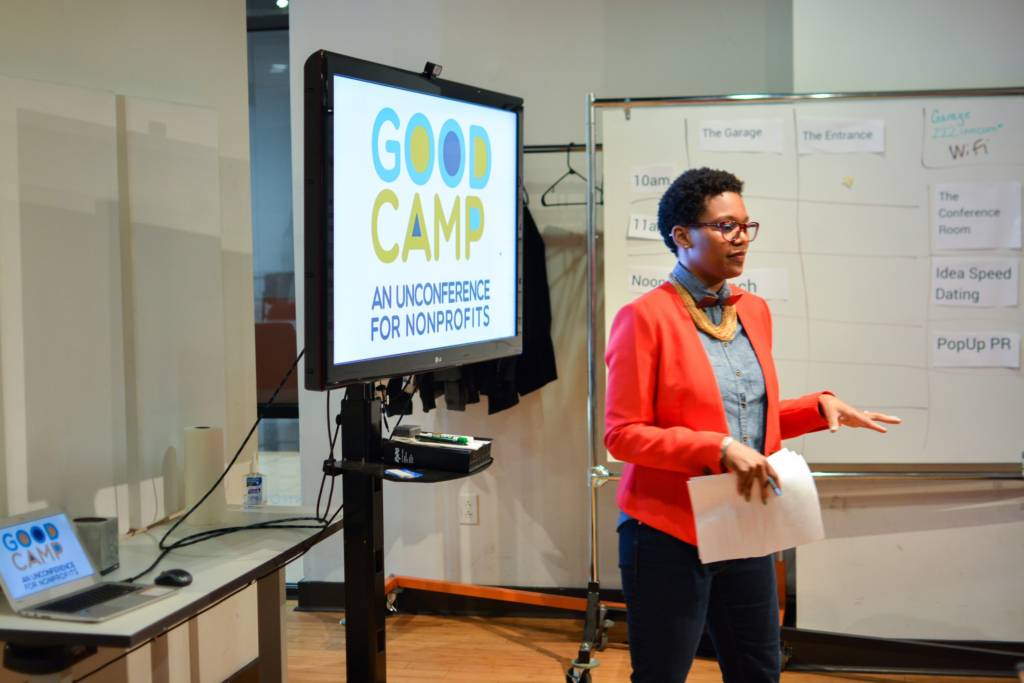Embracing Shared Leadership: A Conversation Introducing Jenifer Daniels as Our New Co-Executive Director

Interviewer
Tell us about Allied Media Projects’ decision to move to a Co-Executive Director model.
Jeanette
Allied Media Projects sees our role as being the supportive infrastructure for a distributed network of projects and movements advancing social change. We practice facilitative leadership, which is focused on cultivating and nurturing the leadership of others, through: The Allied Media Conference, the Sponsored Projects Program, and the Speakers Bureau. Now, we are going to be more equipped to do that within our organization too by embracing a shared leadership model.
I’m going to focus on the external side of Allied Media Projects by supporting The Allied Media Conference, and the Speakers Bureau, and our external partnerships (especially around the LOVE Building). Jenifer is going to focus on the internal operations, the Sponsored Projects Program, financial systems, and how all of it ties together with HR. We’ll share responsibility for fund development and the bigger picture work of visioning and strategizing.
Jenifer
I echo that sentiment. I’ve been working this way for a long time but didn’t have the language to describe it. In 2008, I started teaching at a university, and it was the best professional development experience that I ever had. I didn’t go in with the intent of being the professor that just stands at the chalkboard and drones on for a few hours. I wanted to help people become better versions of themselves and see that change from the first day they walked in to when they walked out. I want to ensure that AMP’s organizational culture supports our staff in growing and changing as well.
Interviewer
Jenifer, what is a previous project that you are proud of?
Jenifer
In 2018, I created Detroit Human Capital, a micro impact fund that invests in Detroit’s people, places, and purpose. In November 2020, I passed 20 investments, which range from $25 to upwards of $500, depending on the project and impact. The projects span from The Free Black Women’s Library to 6102. ART PARK, a community space for residents of Detroit’s NW Goldberg neighborhood with art installations and murals that celebrate the neighborhood’s history and future. I prioritize projects that function as resources introducing huge opportunities into a neighborhood or into a child’s life. Funding these types of projects transforms development into a community-centered process.
I see this kind of giving as aligned with the concept of decolonizing wealth, as Edgar Villanueva has defined it. Giving may seem like a lofty thing that only people with a lot of assets can participate in, but we can make change with our own pocketbooks. We can say, “the money might not have come in the way we wanted it, but we still have the power to turn it into something positive.” My family budget can help catalyze a neighborhood or change someone’s life.

Interviewer
How have the teachings of Grace Lee Boggs helped prepare us for the current crises we’re facing?
Jeanette
She was always asking “what time is it on the clock of the world?” as a way of locating current crises and sharing a long view of human evolution and planetary history. I think we need that now as we are moving through, in the most hopeful sense, the last gasps of white supremacy, capitalism, and the systems of domination that have shaped reality for recent memory. Grace would remind us that human history and planetary history is much, much longer than the history of these systems of domination. She has helped instill in me, and a lot of people at AMP, this sense of being able to envision past the end of what we know so that we can create the world anew on the other side. We need to resist and dismantle the existing systems, while also prioritizing care, developing new types of relationships, and creating new models that will outlive them.
Jenifer
I experience Grace as a truth teller who helps you to see alternatives. They are in you. Let’s live alternative realities and let’s present those truths to other people. When I think about Detroit, I think about a city where innovation is at its heart beat. Right now, Detroiters are drawing inspiration from the past. There’s a movement to bypass the capitalist systems of Uber Eats and DoorDash through Black and Mobile, a food delivery service for black-owned restaurants. Restaurant owners that are clustered together have figured out that, if they make food in bulk and deliver it themselves, they can survive this pandemic. I’m excited to see Detroiters rewriting the narrative and figuring it out together.
Interviewer
How do you plan to prioritize the overall vision of AMP while also promoting an effective, accountable, and equitable organization internally?
Jenifer
Some of the biggest revelations that have emerged from the pandemic for me are questions—what are my capabilities and what are the things that I don’t know? Where are the places that I want to grow? How do I want to create space in my life so that I can bring my whole self to work, while also taking time to be a full person and relax?
This was a role that I was looking for. And a lot of the things that Jeanette said she wanted from this partnership were things that I’d been journaling about. I’m excited about the opportunity to dig deeper. We’ve had a lot of conversations examining how work actually works: How do we place limits on how we work? Can we improve the systems so that they create personal space that edifies our staff? We are telling the folks who participate in Allied Media Projects, whether it’s through the Sponsored Projects or the Allied Media Conference, that they should center care and cultivate joy. Can we live that at work? And what does that look like in practice? Specifically, for Jeanette, that meant her saying “I need help.” Her willingness to be vulnerable put us on a path where we can live out our values in an even deeper way.
Interviewer
During this challenging year, in what ways has media been used to build progressive solutions for the evolving needs of our community?
Jenifer
I’ve seen the power of education through media, specifically on TikTok. There’s been a movement of people in the social justice space who are using that short span of video to educate people on a myriad of topics. It has been powerful to know that folks can totally become illuminated in less than three minutes around disability justice issues, around Indigenous issues, around Black Lives Matter, around Transgender issues. The fact that people have been able to shape TikTok for this purpose when it was not the intent of the platform. Something about the way in which the messages carry and share on that particular tool, it’s almost like it was tailor-made to be a PSA, essentially.
Jeanette
The Movement for Black Lives has built so much infrastructure and strategy in the past six years. It’s been interesting seeing the strategies evolve — mobilizations that were both spontaneous and tied into visionary legislation like the Breathe Act, the production of Black National Convention, and all the ways they used media & technology to put racial justice at the center of the whole election cycle. Organizers stitched together these holistic and layered narratives into a political vision that centers Black liberation but touches on so many other movements, too. That was thrilling to witness in recent months.
Interviewer
What are you excited about for Allied Media Projects going into 2021?
Jeanette
We’re entering into a new era of the organization’s life as far as our rootedness in Detroit. Since AMP moved here in 2006, we’ve prioritized work that’s relevant to and actively supporting Detroit organizers, artists, and residents working at that intersection of art, social justice, and technology.
The LOVE Building is an opportunity to take our rootedness to the next level. Embarking on this community-based real estate journey enables us to explore how we live into this hybrid identity as an organization that is both locally rooted and national facing. Alongside the co-directorship, it really multiplies our ability to align our values in terms of how we nurture our programs, while also attending to the internal world of AMP.
Jenifer
I get excited to think that AMP is going to be a central tenet in what Detroit looks like tomorrow or a year from now. We can become a model for this kind of change. The vision that Jeanette has set forth for AMP gives us space and breathing room to build that capacity, make investments in the city, and become a vision for other places.